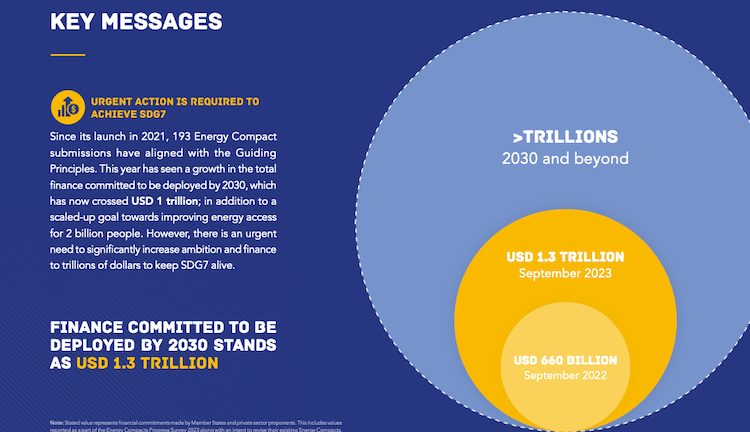By J Nastranis*
NEW YORK. 15 September 2023 (IDN) —Transition to green energy, addressing energy poverty and decarbonization, requires a considerable investment and impact. In the wake of new multibillion-dollar commitments to boost renewable energy, electricity access, and clean cooking technologies by 2030, the UN has therefore pledged trillions of dollars in finance and investment to aid in the energy transition.
The second annual Energy Compact progress report launched on 15 September 2023, shows an uptick in “Energy Compact” voluntary commitments to be deployed by 2030. Towards net-zero emissions by 2050, the world will reduce the 675 million people who don’t have electricity and the 2 billion who cook with polluting fuels.
Ahead of the upcoming United Nations SDG Summit 2023 on 18-19 September, a report has found that only 15 percent of measurable targets are on track. To meet the deadline of 2030, goals such as ensuring clean and affordable energy for all—SDG 7—need to be met but unfortunately, progress has not been quick enough. For net-zero emissions by 2050 and limiting warming to 1.5 degrees C compared to pre-industrial temperatures, this goal must be achieved in order to ensure our safety from climate catastrophes. Achieving SDG 7 and related objectives necessitates increased commitment towards a clean energy transition and an investment range of USD 22-48 trillion in the next decade.
The new progress report illustrates the expanded commitments and investments made by governments and other sectors to improve energy access, efficiency, and renewable sources. This builds on the USD 600 billion in finance and investment allocated due to nearly 200 Energy Compacts associated with the 2021 UN High-level Dialogue on Energy. This total amounts to USD 1.1 trillion planned for spending in these areas.
In the run-up to the SDG Summit, the UN development system has selected 12 high-impact initiatives to scale up progress by 2030. They will be featured at a high-level event on 17 September during SDG Action Weekend.
A clarion call for action
The Energy Compacts offer irrefutable proof of governments and the private sector’s increasing determination to hasten a fair transformation, which will reduce the constant expansion of climate change and deliver life-altering access to clean, economical energy sources. “With future generations foremost in our minds, we must now invest in renewable energy that will power the economies of tomorrow,” declared Achim Steiner, Administrator of the UN Development Programme and Co-Chair of UN-Energy—the network comprised of 30 UN and international organizations that work on energy affairs and back the Energy Compacts.
“This is a clarion call to action, urging governments, the private sector and multi-stakeholder coalitions to take action far and fast in order to tackle the energy challenges of our time and build a clean energy future,” Damilola Ogunbiyi, the Special Representative of the UN Secretary-General for Sustainable Energy for All and Co-Chair of UN-Energy said.
The UN Secretary-General has asked for a Rescue Plan to safeguard People and Planet. Such a plan should put an end to our assault on nature by prioritizing policies and investments that would facilitate advancement through all SDGs. According to Li Junhua, Under-Secretary-General of the Department of Economic and Social Affairs (which is part of UN-Energy’s secretariat), the role of Energy Compacts cannot be overestimated in driving the changes needed to form a better world for everyone.
Impacts that are expanding
Since the Energy Compacts began in 2021, they have had significant impacts, according to the report. The Energy Compact proponents have improved electricity access for 129 million people by providing new and improved electricity connections, up from 6.2 million one year ago. In addition, 22 million people were able to access clean cooking during 2021-2023, an increase of 50 percent over last year.
The private sector mobilized or deployed USD 105 billion in finance for Energy Compact actions between 2021 and 2023. Energy efficiency improvements saved nearly 15,000 GWh over the past two years, a six-fold increase over the previous year. In 2021-2023, installed renewable energy capacity doubled from 89GW to 181GW as a result of 55 different Energy Compacts.
As one of the Energy Compacts highlighted in the report, the Compact for 24/7 Carbon-Free Energy has 132 signatories committed to providing clean, affordable electricity and enabling organizations to meet their entire electricity demand with carbon-free resources. By 2026, the Powering Healthcare Compact will bring electricity to 25,000 health facilities, double what it had in 2021. The No New Coal Compact now has 14 signatories, doubling its size in 2021.
Energy Compacts involving 193 stakeholders include 51 UN Member States commitments, 59 private sector commitments, and 83 catalytic partnerships. UN-Energy is committed to scaling up the number and scope of Energy Compact commitments in order to achieve SDG 7 and meet the massive challenge of a just and equitable energy transition. Criteria and submission forms are available online. [IDN-InDepthNews]
*This report is based on the UN Energy press release.
Image credit: UN Energy
IDN is the flagship agency of the Non-profit International Press Syndicate.


